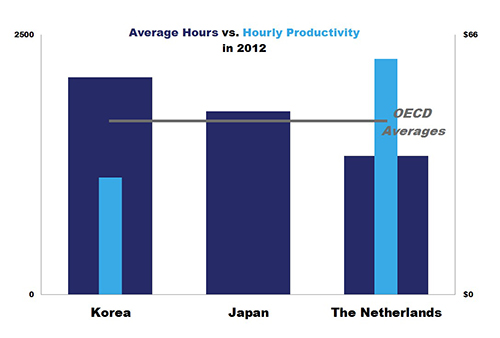Productivity is the essence of any thriving business, and the truth is that there are an array of factors which influence worker productivity – far beyond merely an employee’s willingness to work.
Things aren’t looking so hot in Korea right now, though, with the productivity stats looking pretty dismal across the country and its citizens’ work-life balances seemingly beyond repair. This year saw Korea given the title of world’s least productive workforce – and it looks like there are a multitude of reasons that Korea’s workers aren’t delivering. In Korea, overtime is considered entirely natural, with a survey by the Ministry of Employment and Labour showing that a staggering 43.65% of Korean employees are putting in at least an hour of overtime every single day. 20.9% of workers attributed this excessive overtime to a lack of efficiency during office hours – and with 30% failing to use even half of their allotted leave, there’s a culture of all-round inefficiency happening in Korea.

So why is this happening?
Communication Error
Honest and effective communication is essential to any functional (and productive) office environment. Maintaining open relations office-wide is absolutely paramount for a cohesive workforce – but in Korea, things are just a little trickier than that. The constant socialising found amongst Korean employees means that the working environment is susceptible to office factions – and the associated hostility between groups. Because Korean employers fail to instil this sense of community and synergy office-wide, communications are dysfunctional at best. The key to avoiding communication breakdown in your own working environment is to perpetuate a feeling of openness amongst all employers and employees. If your team is working cohesively, productivity is sure to increase.
All Play & No Work
Similarly, social activities encouraged by Korean employers make for infinitely less productive workers. With bosses in Korea paying for workers to go for dinner and drinks together – in the hope of improving employee loyalty and relations – staff spend large proportions of their time at work suffering the after-effects of these heavy rendezvous. Social engagements, particularly amongst fellow employees, are to be encouraged. Having employees spend time together outside of working hours can be fantastic for team morale, and at least for office relations. Moderation is key though – anything beyond office hours that negatively impacts on job performance is a deal-breaker.
Looking Busy
In Korea, you’re likely to find many office employees who believe they are constantly busy, while the productivity figures found in various studies certainly suggest otherwise. With time being utilised ineffectively, employees seem to have mastered the art of looking busy without actually being busy – and the length of time spent in the office only furthers this falsehood. 70% of Korean workers surveyed by the Ministry of Employment and Labour admitted they experience burn-out, with work performance suffering, primarily due to a lack of rest. To guarantee productivity for your own office, your employees need to be confident that their time is being spent in the most worthwhile way possible. The way to do this is by ensuring that your staff know not only what they should be doing but also the desired outcomes of their efforts. This way work can be measured against objectives and productivity can not only be assumed but proven.
The Hierarchy
There’s a culture of rigid reporting in Korea which, while seemingly important in the corporate world, has been taken to unnecessary and counter-productive extremes. Likened in many ways to an army structure, Korean businesses are widely known to have employees reporting to their superiors religiously, providing constant and ongoing updates during time that would likely be better spent on completing the work itself. On top of the time spent in these numerous meetings, the excessive preparation required beforehand means that Korean employees’ time is hardly being spent as productively as possible. While the rigid hierarchies you’ll find in Korea aren’t something you’ll have to contend with in UK office environments, there are still lessons to be learnt. Team meetings can bring great value to employee focus and overall team morale – which in turn maximise productivity – but it’s essential to make sure that discussing what has been achieved doesn’t get in the way of the next thing being achieved. It’s all about balance, and as long as the majority of the time is spent on actions rather than reactions, productivity should be wonderful. The bottom line is that it all hangs in the work-life balance. By making sure that employees are working no longer than they need to, allowing them ample personal time – while still making sure that their working time offers maximum impact – productivity should be very much where you’d expect it to be.








